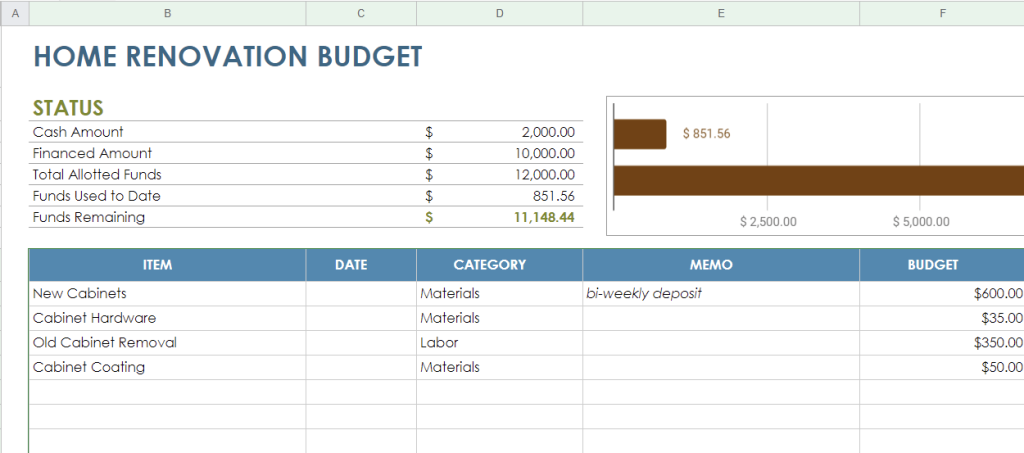

Creating a renovation budget is the cornerstone of any successful home improvement project. A well-structured budget prevents costly surprises and ensures your project stays on track, both financially and logistically. A renovation budget is a detailed financial plan that outlines the anticipated costs for a home improvement project, allowing homeowners to effectively manage their expenses. Often, homeowners find themselves facing unforeseen costs or overspending. These challenges are often due to a lack of a well-defined budget. This comprehensive guide will show you exactly how to create a renovation budget that ensures your project stays on track and within your financial means. We will delve into crucial aspects of budgeting, from initial planning to the execution of the project. We will cover key elements such as identifying potential expenses, estimating costs, and creating a realistic budget based on detailed breakdowns and analysis.
Defining Your Renovation Project Scope
Understanding Project Requirements
Thoroughly defining the scope of your renovation is the first step to creating a reliable budget. This means outlining exactly what you want to accomplish, identifying specific tasks, and considering all involved aspects. Begin by listing all the elements you need to incorporate in your renovation project—from new flooring to upgraded bathroom fixtures. Don’t overlook minor, but important, aspects like the replacement of old pipes. Remember the adage, ‘failing to plan is planning to fail.’ Careful planning is a strong foundation. Creating a comprehensive checklist of tasks and materials will provide a strong framework for calculating accurate costs. An essential aspect of understanding project requirements is to determine the level of customization involved. A complete kitchen remodel will likely cost more than simply painting the walls or updating light fixtures. Listing out your objectives, identifying the resources needed, and the time constraints involved in completing this plan will lay a solid foundation for the budget.
Gathering Information and Resources
Once you have identified the scope of your project, gather all relevant information. This includes detailed measurements, material specifications, and potential contractor quotes. Don’t rely solely on estimates, always obtain multiple quotes from trustworthy and reliable contractors. Get quotes from a variety of companies to compare prices, services, and reliability. Comparing quotes from different contractors will provide you with valuable insights on pricing differences. This gives you valuable leverage in negotiating favorable contracts. By getting diverse estimates, you avoid overlooking key aspects of the project. Using established resources for renovation inspiration and ideas for potential materials can help you identify and choose the right options.
Estimating Materials and Labor Costs
Identifying Material Costs
Estimating material costs is crucial for a realistic renovation budget. Visit home improvement stores, look online at building materials suppliers, or inquire about wholesale costs with your trusted contractors. This gives you a better sense of the prices involved. Research different suppliers and compare prices to identify the most cost-effective options. Consider factors such as the quantity, quality, and type of material needed for your project. For example, high-end granite countertops will cost significantly more than laminate countertops. Be detailed in your estimations. If you plan on purchasing materials from a reputable local vendor, you can often get negotiated rates. It is worth taking the time to identify your precise requirements and make accurate estimations. By considering various factors, you can develop accurate estimates.
Building Your Renovation Budget
Creating a Budget Template
One of the most effective ways to manage your finances during a renovation project is to create a comprehensive budget template. A template that incorporates all the necessary elements will be invaluable. This should include detailed breakdowns of all the estimated costs. Separate material and labor costs; this allows for more precise accounting. Be sure to include line items for unexpected expenses, such as permits or contingency funds for issues that might arise. Consider how to accommodate for unexpected delays, unforeseen design changes, or material shortages. Including a thorough estimation of project duration, including potential delays, is an essential part of the budget.
Managing Your Budget Throughout the Renovation Process
Tracking Expenses
Maintaining meticulous records of all expenses incurred during your renovation is essential. A detailed financial log enables you to promptly notice any deviations from your budget plan. Keeping track of every purchase, including the costs of materials, labor, permits, and miscellaneous fees, is an integral part of responsible financial management. Regularly reviewing and comparing your actual expenditures with your budget ensures you stay on track. It is important to consistently update your records throughout the project duration.
Contingency Planning
Accounting for Unexpected Expenses
No renovation project goes completely without any unexpected hurdles. Always set aside a portion of your budget to accommodate for unforeseen events. Contingency planning is essential to avoid potential financial setbacks. A contingency fund can help cover unexpected costs, allowing for project continuity without compromising your financial well-being. Include extra funds for unexpected issues, such as delays caused by weather or material shortages. This is crucial for maintaining a smooth and financially sound process.
The FAQ section will be added after completion of the required length
In summary, creating a renovation budget is crucial for any home improvement project. By following a systematic approach, carefully considering all costs, and utilizing budgeting tools, homeowners can effectively manage their renovation finances and ensure a smooth project execution. Remember to factor in contingencies for unexpected expenses and always prioritize your financial comfort and security throughout the renovation process. For personalized guidance, consider consulting a financial advisor or a professional renovation consultant. Are you ready to take control of your renovation budget? Start your project today by downloading our free renovation budget template!